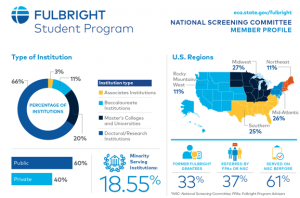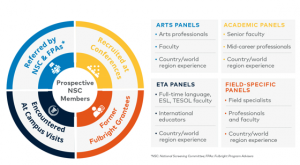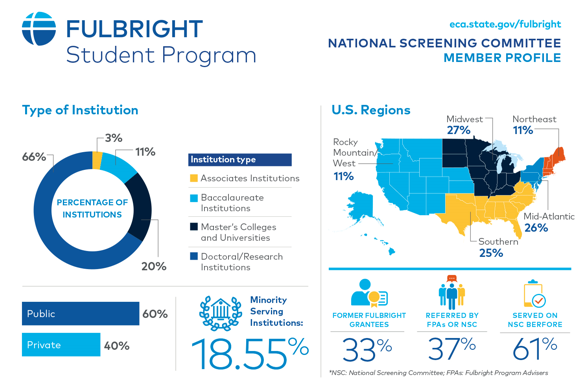By Fulbright Program Staff
Congratulations on submitting your Fulbright application! Now what? Have you ever wondered what happens to your Fulbright application after you hit “submit”? In this post, we’ll shed light on the Fulbright U.S. Student Program’s technical review and National Screening Committee (NSC) processes, illustrating how an applicant becomes a Fulbrighter.
1. First things first… Technical Review
After you hit “submit,” Fulbright Program staff first conducts a technical review of your application materials. Therefore, it pays to thoroughly review country descriptions and eligibility criteria at the beginning of your application journey to ensure that you meet all requirements. Check out our handy application checklist to make sure you don’t forget to include any application materials, too.
During our technical review, we double-check your biographical data, citizenship, transcripts, letters of recommendation, project plans, and more for eligibility and completeness. Make sure that ALL required materials are successfully uploaded and viewable in your online application portal—you won’t be able to add missing documents later! (Hint: Be sure to view and save a PDF copy of your application before submitting—you’ll have both a copy of your application for your records and be able to confirm that all documents are successfully submitted and readable!)
After confirming an application is eligible and complete, it is moved to the National Screening Committee (NSC) for review.
2. The NSC: The Reviewers (and What They Are Looking For)
During “NSC Season,” almost 200 committees meet to review and discuss all successfully submitted applications. Each application is sent to a committee of three reviewers a.k.a. NSC members, for a transparent, merit-based review process.
Who exactly are these reviewers? The individuals that review your application are typically university professors with expertise in either a) your academic/professional field, or b) the country or world region where you propose undertaking your Fulbright. Many are Fulbright alumni, while others have been recommended by Fulbright Program Advisers or other NSC members. Reviewers reflect the diversity of the U.S. higher education community and include panelists from minority-serving institutions (MSIs), Historically Black Colleges & Universities (HBCUs), and other underrepresented institutions.
Each committee reviews approximately 60-70 applications in advance of a meeting, scoring each submission based on specific review criteria. While all programs and applicants are unique, NSC reviewers look for well-researched, feasible research and community engagement projects, adequate academic and personal preparation for the proposed country or award, and personal attributes and qualities that illustrate a positive and passionate cultural ambassador of the United States to the world. Be authentically you!


3. NSC Review Day
Throughout November and December, NSC reviewers gather for review meetings. Committees consist of three reviewers and one staff facilitator who directs the flow of the meeting, answers reviewers’ questions about the Fulbright Program, and records results. At these meetings, reviewers discuss each application using a collaborative approach and are welcome to adjust their scores based on their conversation. At the end of the meeting, final scores are tabulated by the staff facilitator, determining which candidates the committee recommends for further consideration during the host country review process.
4. Time & Consideration: The Breakdown
As you may have gathered, the NSC process is a massive undertaking! In 2019, 525 NSC members reviewed approximately 10,400 applications at 175 committee meetings in 6 different cities. From start to finish, more than 11,000 hours are spent screening, reviewing, and scoring each application. And that’s before the in-country review process!

5. The Decision
Based upon the NSC process, applications are designated as “Recommended” or “Non-Recommended.” All applicants are notified of their application’s status, and recommended applicants become “Semi-Finalists!” Recommended applications are forwarded to their respective Fulbright host countries for an additional round of selection, taking into account Fulbright Commission and U.S. Embassy priorities. During this period, Semi-Finalists undertaking research or graduate degree programs may be asked to submit letters of acceptance or affiliation from their proposed institution, so it’s important to receive all necessary documents as soon as possible. In some cases, host countries may also choose to contact Semi-Finalists for short phone or video chat interviews, in order to get a better sense of the person behind the application.
After months of concentrated effort by both applicants and Fulbright Program staff, host countries will share final application notifications on a rolling basis between February and May. Successful applicants are sent an award offer, and are officially known as “Finalists.” Qualified applicants not selected as Finalists may become “Alternates,” or potential awardees that may receive an award offer, should additional funding become available. Non-selected applicants are encouraged to celebrate their Semi-Finalist status, and reapply for the next award cycle. Even those who are not selected should feel extremely proud of their efforts, and know that many parts of the application can be applied to future endeavors beyond Fulbright, such as applying to graduate school.
The Fulbright U.S. Student Program application process is undoubtedly long. We hope this article provides some clarity into the process, and helps you create the best application you can. In writing, editing, and discussing your candidacy with friends, mentors, Fulbright Program Advisers, and other individuals, you may gain greater insight into your passions, your reasons for pursuing a Fulbright, other transferable skills you possess, and insight into our world. Our best wishes for a successful application and bright future!

